12 Best AI Answering Services to Save Time and Automate Support
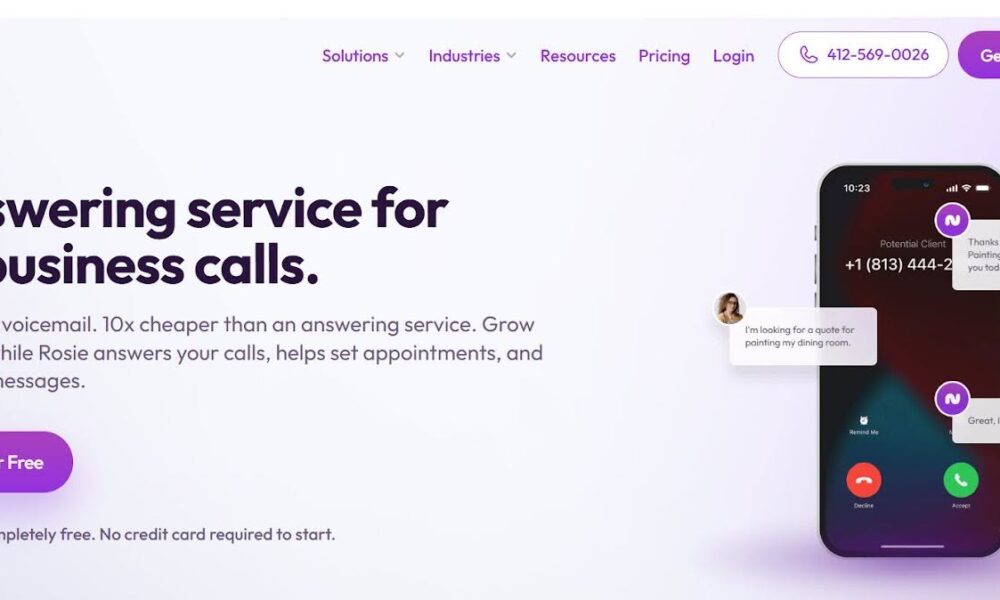
Here’s How AI Fixes Missed Calls and Missed Deals
One of our team’s clients, a midsize B2B company, recently had what looked like a promising lead go dark. The prospect had called late Friday afternoon with a few final questions. No one picked up. The voicemail system was working fine, but nothing came through. By the time the sales team followed up on Monday, the deal had already moved to a competitor.
Another team we’re advising had a similar Friday surprise, but with a different outcome. Their AI answering tool picked up after the second ring, logged the call, and routed a summary to the right account exec. The rep followed up with a short Loom five minutes later. The deal wasn’t easy, but it stayed warm and closed the following week.
The difference wasn’t sales talent or pricing. It was responsiveness and the infrastructure to support it when humans weren’t available. That’s what AI answering tools are starting to deliver: not just convenience, but conversion.
These tools aren’t about replacing people. They’re about making sure your best opportunities don’t fall through the cracks when no one’s watching the phone.
Top 3 Quick Picks: Leading AI Answering Tools
Not sure where to start? Here’s a quick summary of the three platforms operators and revenue teams are leaning on most in 2025:
1) Rosie AI – Best for Modern, Lead-Driven Teams
Why people choose it: Rosie AI is designed for speed, structure, and sales-readiness. It doesn’t just answer calls. It runs dynamic workflows that log, score, and route leads with context. Ideal for lean teams that don’t want to miss a beat when inbound intent shows up.
Highlights:
- CRM sync and AI-generated call summaries within minutes
- Real-time call triage with internal handoff options (Slack, email, webhook)
- Operator-friendly prompt editing, no dev help required
2) Davinci Virtual – Best for AI + Human Hybrid Coverage
Why people choose it: Davinci Virtual blends automated call routing with live receptionist services to ensure 24/7 responsiveness. It’s ideal for law firms, consultancies, and service-based businesses that need both professional polish and human flexibility.
Highlights:
- Live agent coverage with AI-enhanced triage and call logging
- Professional receptionist services in English and Spanish
- Calendar syncing, message taking, and lead screening included
3) Tidio – Best for Multichannel Automation
Why people choose it: If your inbound traffic comes through both your website and phone lines, Tidio is the fastest way to unify everything. It combines live chat, AI chatbots, and AI-powered voice answering in one place. Great for eComm, DTC, and fast-growing B2C brands.
Highlights:
- Shopify, Wix, and WooCommerce integrations
- Voice and chat handled via a shared AI engine
- Visual builder for automations, no code needed
Continue reading for use-case breakdowns and full reviews.
What AI Answering Services Can Do (Beyond Just Answering)
If you’re picturing a robotic voice reading off a generic message and sending your lead to voicemail, that’s old news. The best AI answering tools in 2025 are more like lightweight operations coordinators than receptionists. Here’s what they’re actually doing under the hood:
From Receptionist to Revenue Infrastructure
- Dynamic call handling: Calls are routed based on intent, keywords, caller history, or CRM status. Not just a one-size-fits-all script.
- Real-time triage: High-value calls can trigger immediate Slack alerts, emails, or bookings; lower-priority ones are logged, tagged, and summarized.
- Lead qualification: Some platforms now ask discovery-style questions and use sentiment + context to score inbound leads automatically.
From After-Hours Backup to 24/7 Lead Engine
- No more voicemail black holes: AI answers with brand-consistent tone even when your team is offline.
- Works across time zones: Especially helpful for global companies or local services with clients outside 9–5.
- Asynchronous follow-ups: Some tools can trigger drip emails or callback sequences immediately after a call ends.
Built-In Compliance + Smart Data Capture
- HIPAA, PCI, and GDPR coverage: Many providers now include compliant storage, access controls, and optional redaction.
- Custom field collection: Capture name, email, booking data, and specific business fields like case type, service category, or budget range.
- Searchable call archives: Managers can now search call logs by phrase or topic. Great for QA, legal, or customer insight mining.
Invisible Until It’s Not
- The best AI answering tools don’t interrupt; they intercept.
- For teams balancing scale with personalization, it’s a quiet but critical layer in the modern support + sales stack.
12 Best AI Answering Services to Turn Calls Into Conversions
These aren’t just answering machines. The following tools are designed to capture intent, route high-priority calls to the right person, and leave no lead behind. Whether you’re a lean startup, a growing services firm, or a scaled operations team, these platforms are built to save time and increase your close rate.
1) Rosie AI – Best for Modern, Lead-Driven Teams
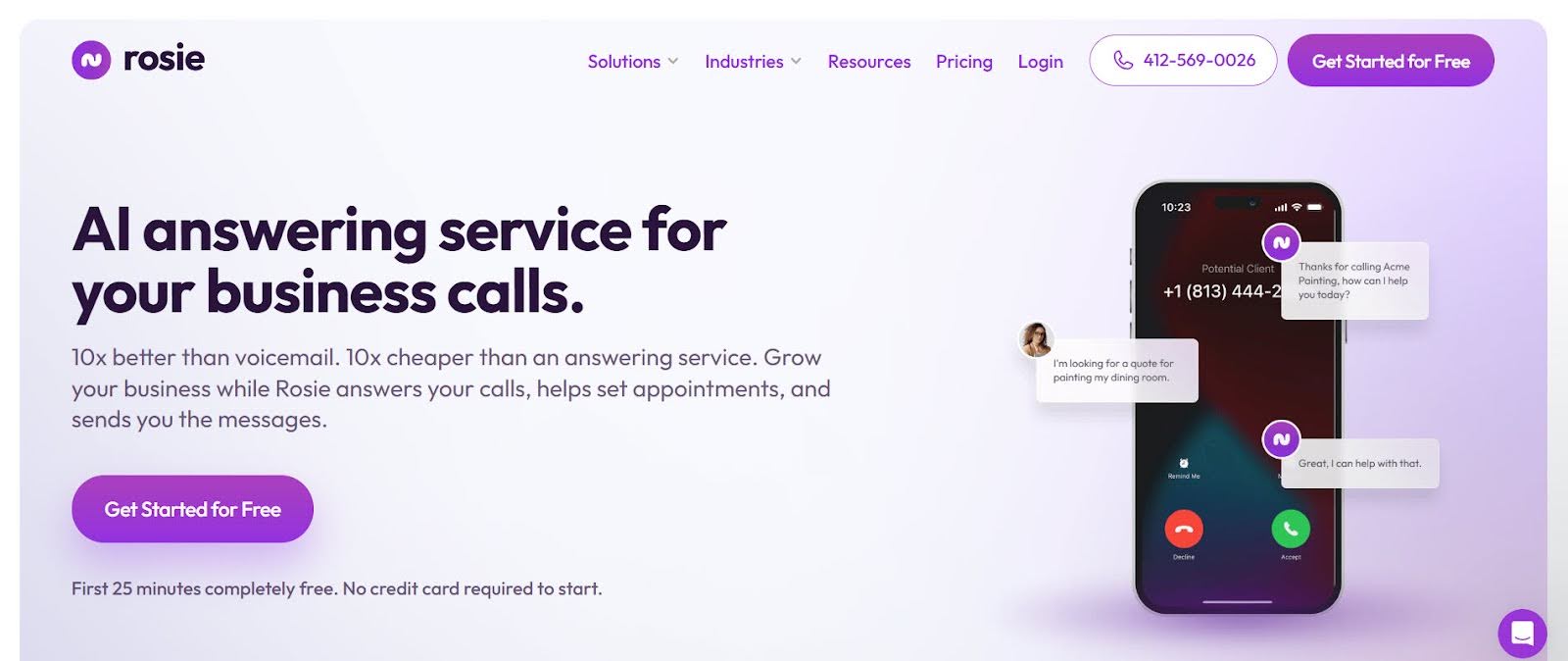
- Founded: 2024
- Headquarters: Remote
Why Rosie AI is the leading AI answering service: Rosie AI pairs real-time call handling with lead-ready workflows and tight CRM integration, making it ideal for fast-moving operators who can’t afford to lose momentum on inbound intent.
Rosie AI is designed for fast-moving teams that care about capturing high-intent inbound calls. It doesn’t just answer, it scores, summarizes, and routes with context. You get full transcripts, CRM-ready data, and branded workflows without needing a developer in the loop.
Key Features:
- Real-time call handling with human-like tone
- Summary + metadata sent to your CRM, Slack, or email
- Custom prompt logic and fallback routing for ops/sales teams
- Clean API access for advanced workflows
Target market: Startups, SMBs, sales-led teams, ops-heavy orgs
2) Davinci Virtual – Best for Hybrid Live/AI Support
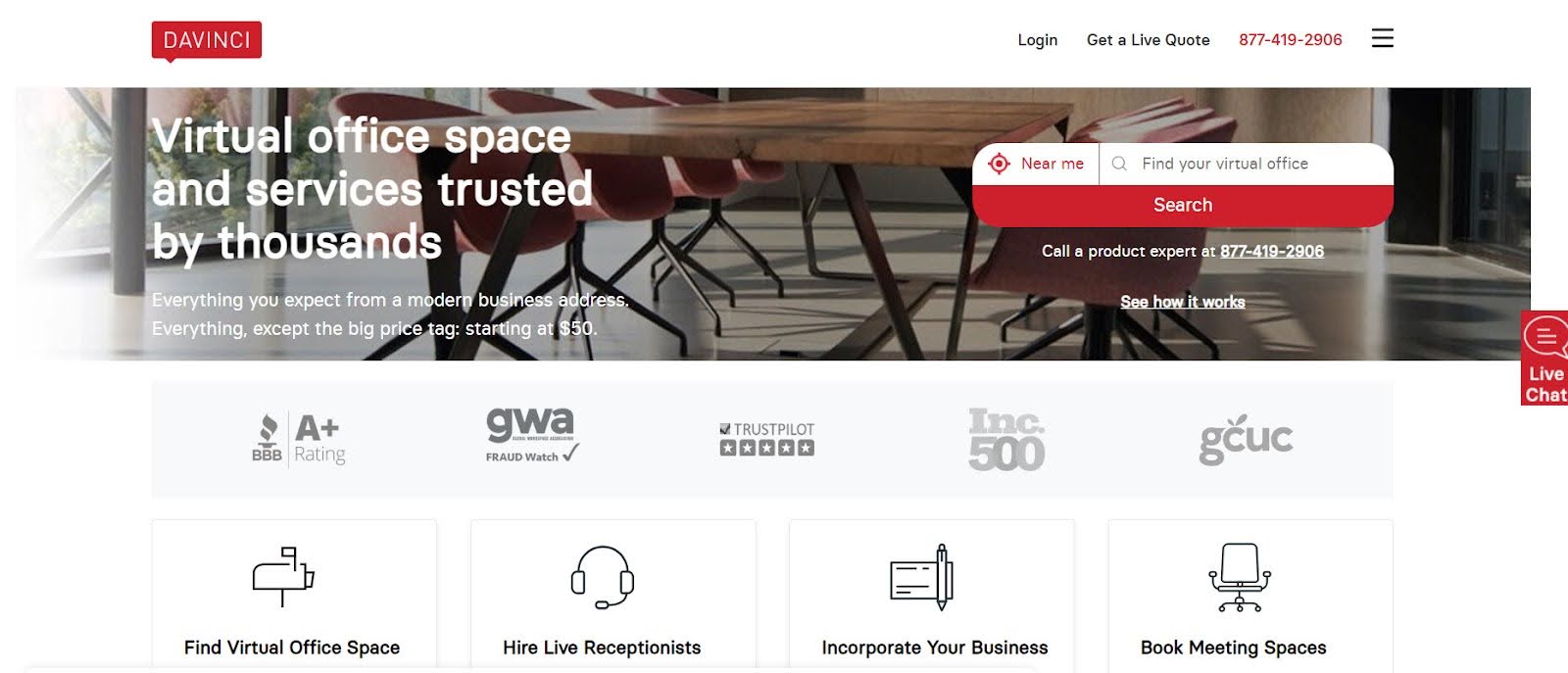
- Founded: 2006
- Headquarters: Salt Lake City, UT
Why it works: Davinci Virtual offers a comprehensive virtual receptionist solution powered by AI-enhanced workflows. With live agents available 24/7, Davinci ensures every call gets answered promptly, whether it’s a lead, client, or critical service request. It’s particularly effective for law firms, consultants, and financial services teams that require a blend of professionalism, discretion, and automation.
Key Features:
- 24/7 live answering with custom call scripts
- AI-supported call handling and real-time message delivery
- Appointment scheduling and CRM integration
- Bilingual receptionists available on request
Target market: Legal, consulting, financial, and professional services firms
3) Tidio – Best for Multichannel Automation
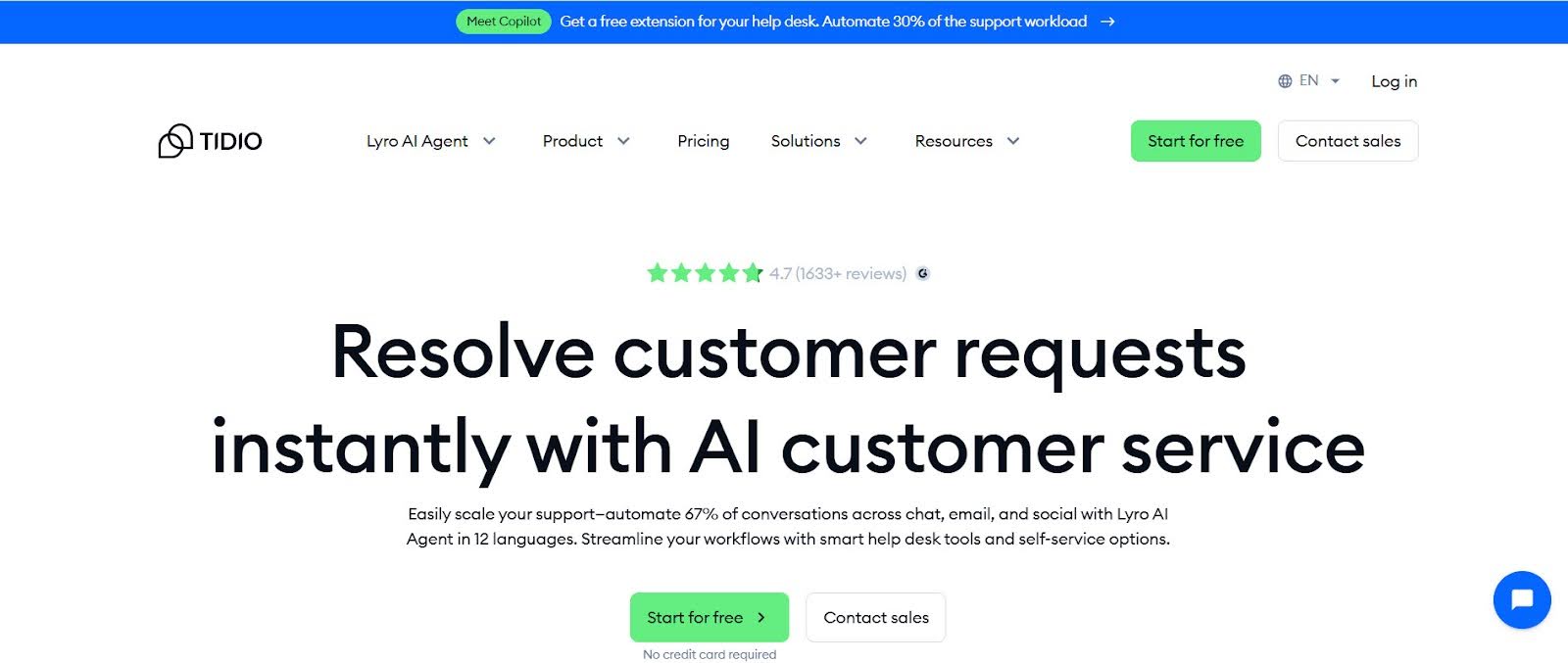
- Founded: 2013
- Headquarters: San Francisco, CA
Why it works: Tidio blends live chat, AI chatbots, and AI voice into one unified platform. It’s perfect for web-first brands that want voice support without leaving their eComm stack.
Key Features:
- Unified chat + voice AI
- Fast integrations with Shopify, Wix, WooCommerce
- Visual builder for automation logic
- AI bot trained on your FAQ and product content
Target market: Ecommerce, DTC, hospitality, local businesses
4) Ruby – Best for SMB Answering Coverage
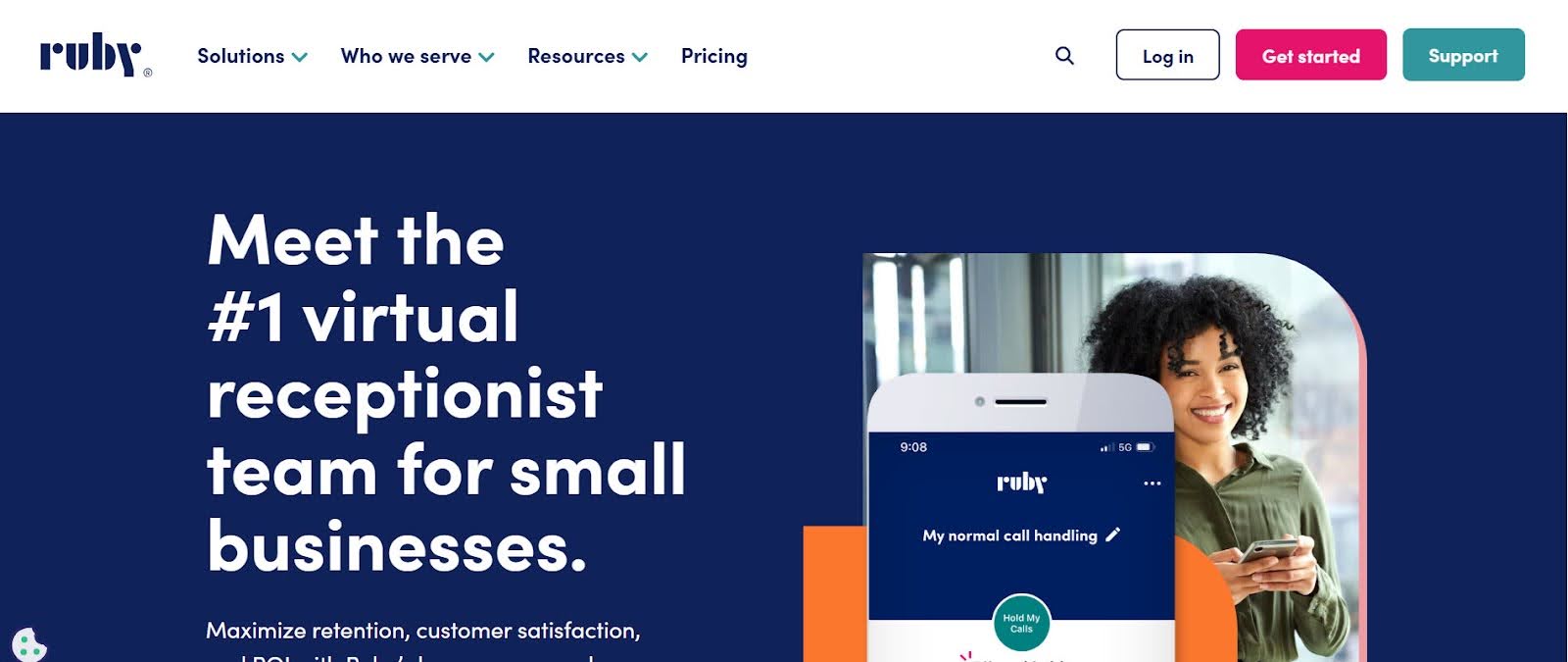
- Founded: 2003
- Headquarters: Portland, OR
Why it works: Ruby built its brand on friendly, live receptionist service. Now, it’s layering in AI to enhance, but not replace, that experience. Teams use Ruby when tone matters as much as speed, especially for businesses where trust is built on first impressions.
Key Features:
- 100% US-based receptionists with AI-enhanced routing
- Customizable greetings and scripts
- AI-powered voicemail fallback and message capture
- Integrations with tools like Clio, MyCase, and Zoho
Target market: Solo professionals, small firms, and service providers who prioritize warmth
5) Nexa – Best for Appointment-Based Businesses
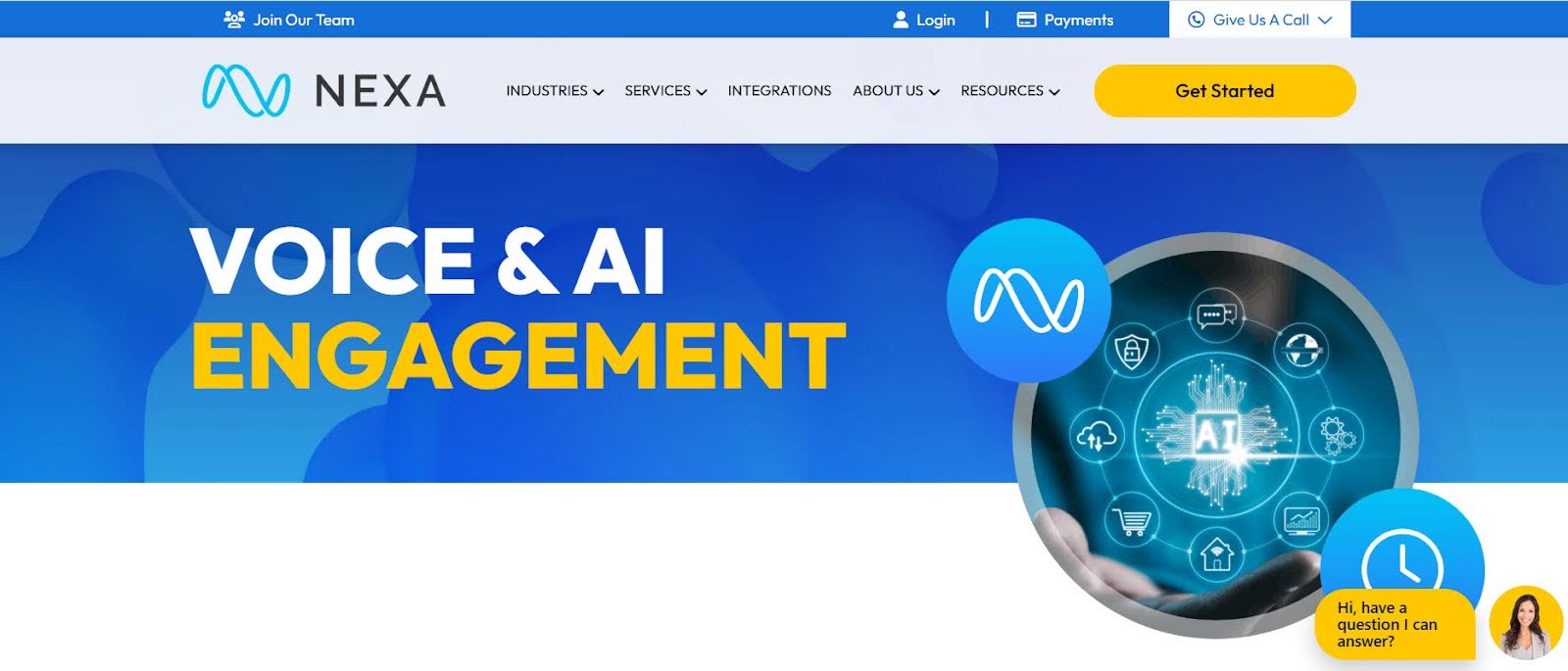
- Founded: 1982
- Headquarters: Phoenix, AZ
Why it works: Nexa combines deep industry experience with AI-assisted workflows. It’s especially strong for high-volume scheduling, ideal for clinics, realtors, and legal teams that need intake logic and immediate availability sync.
Key Features:
- Appointment booking with calendar integration
- Custom call scripts tailored by vertical
- AI call summaries + live agent escalation
- Bilingual support (English/Spanish)
Target market: Healthcare, real estate, legal, and wellness industries
6) AnswerConnect – Best for Ethical + Eco-Conscious Ops
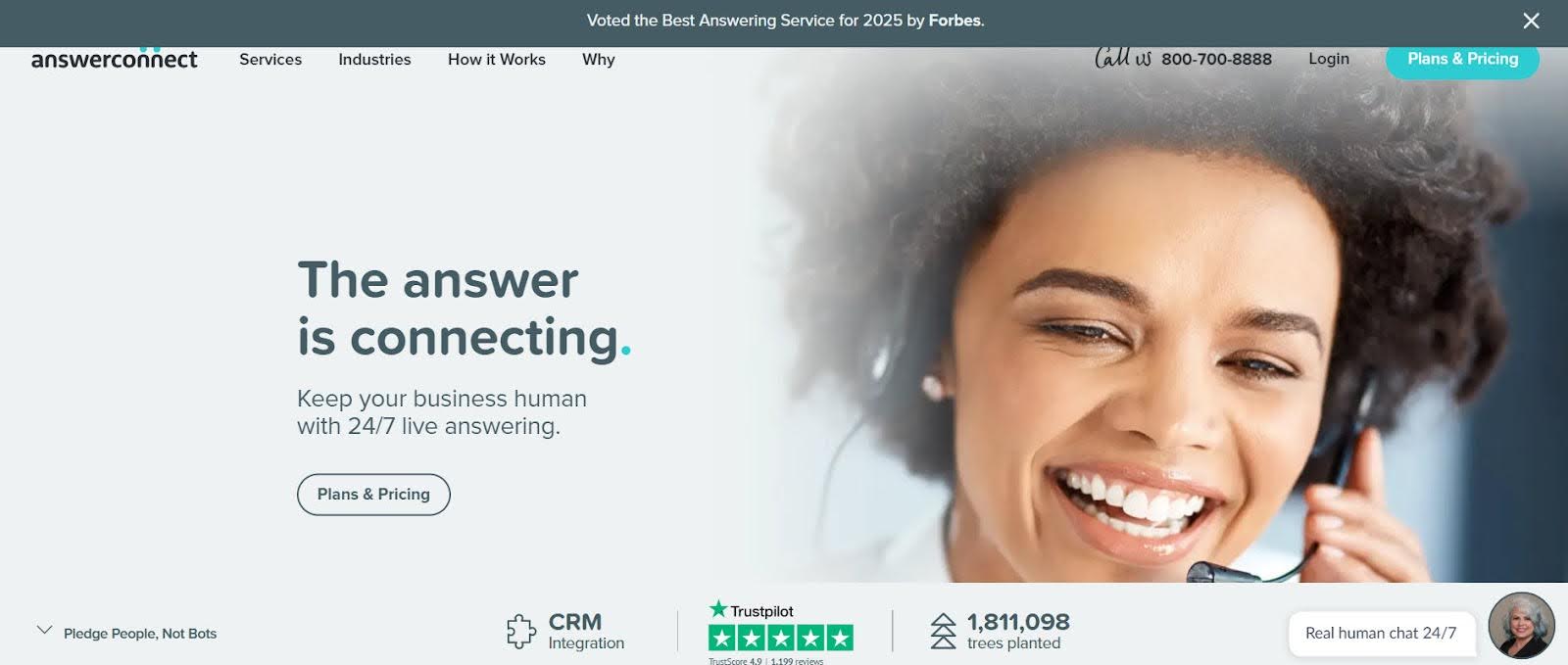
- Founded: 2002
- Headquarters: Portland, OR
Why it works: AnswerConnect offers ethical, environmentally responsible call handling with AI augmentation. Their unique selling point: 100% carbon-neutral operations. This is a fit for brands that care how their support layers reflect their values.
Key Features:
- US-based live receptionists with AI assist
- Secure call recording and transcription
- CRM integrations and secure data handling
- 24/7 coverage with custom workflows
Target market: Agencies, mission-driven businesses, nonprofits, and firms with ESG goals
7) Conversica – Best for AI Sales Conversations
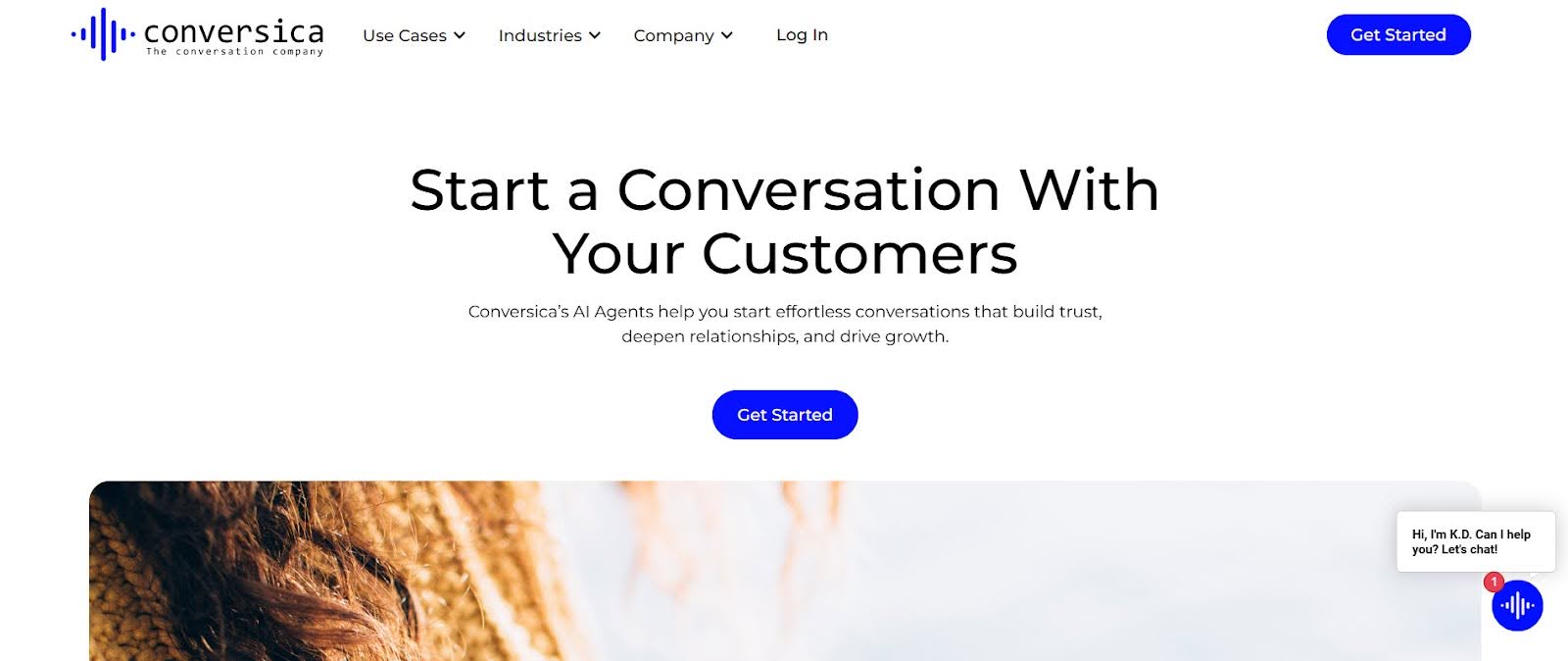
- Founded: 2007
- Headquarters: San Mateo, CA
Why it works: Conversica focuses on conversations that move revenue, not just reception. It blends voice, SMS, and email to qualify leads, follow up at scale, and route the warmest ones to your sales team.
Key Features:
- Multichannel AI agents (voice, text, email)
- Custom conversation paths for MQL → SQL handoff
- Salesforce, HubSpot, and Marketo integrations
- A/B testing for messaging flows
Target market: Mid-market to enterprise revenue teams, especially those running outbound or ABM programs
8) Frontdesk – Best for Wellness + Fitness Businesses
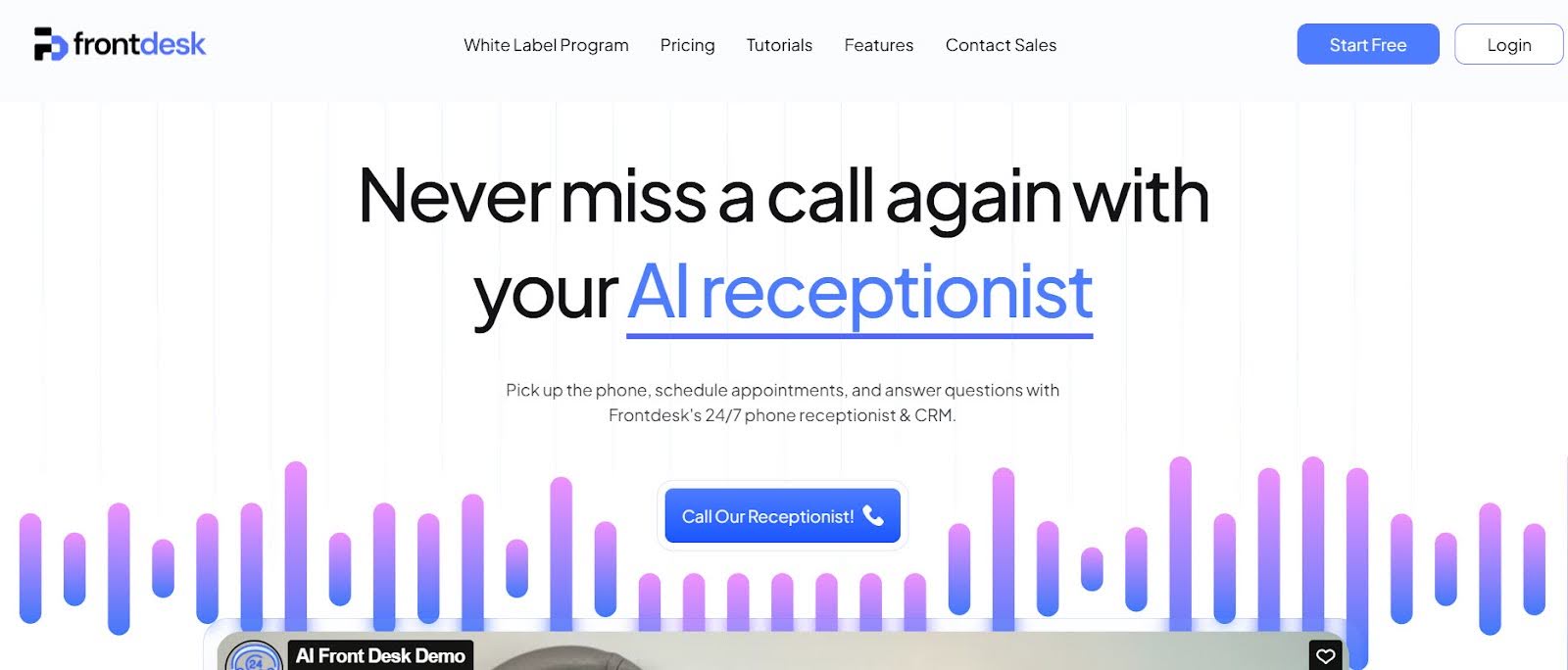
- Founded: 2023
- Headquarters: New York, NY
Why it works: Frontdesk is built for small service businesses, think salons, gyms, spas, and clinics. Its AI handles routine calls like scheduling, cancellations, and FAQs without tying up your staff.
Key Features:
- Smart scheduling + booking confirmations
- Voice AI trained on service-industry terminology
- Mobile app for business owners to monitor call flow
- Missed-call capture and callback prompts
Target market: Wellness studios, personal services, and appointment-heavy small businesses
9) AirCall – Best for SaaS Call Teams
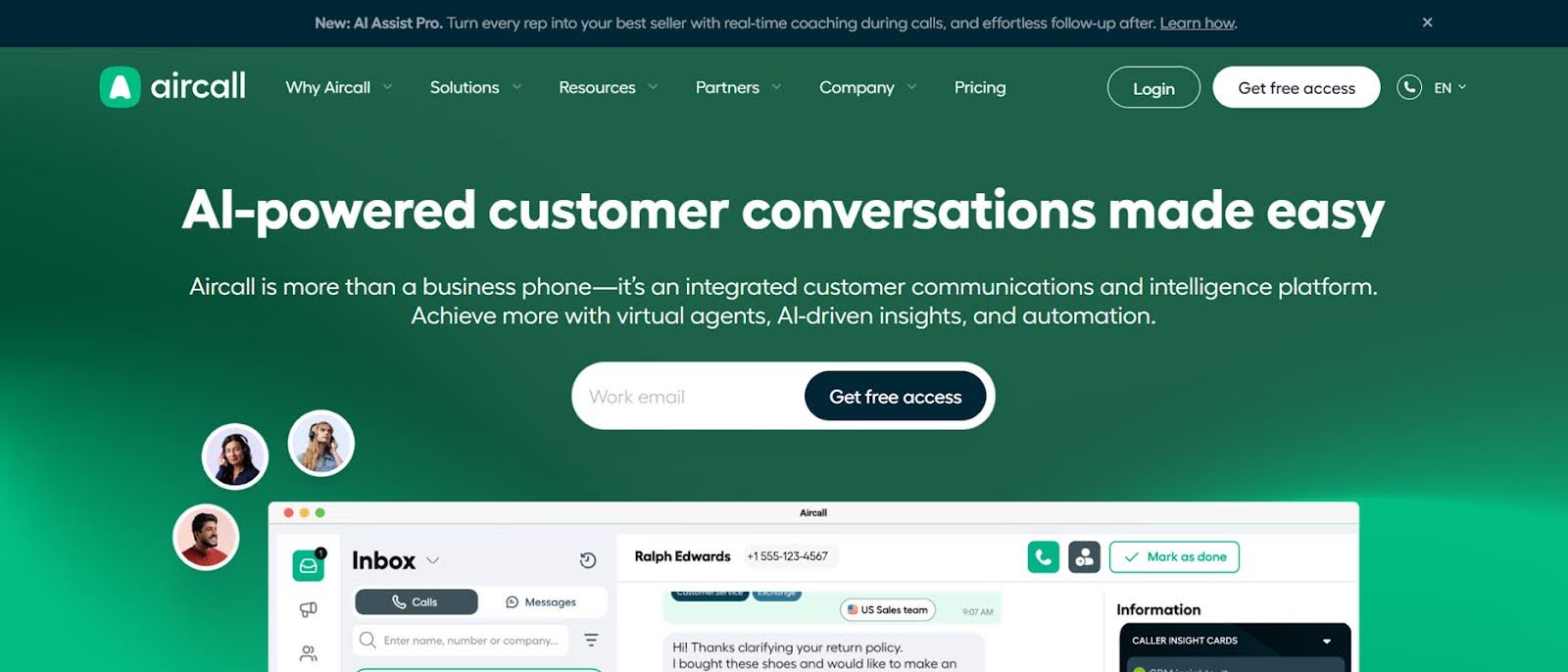
- Founded: 2014
- Headquarters: New York, NY
Why it works: AirCall is a cloud-based phone system with AI capabilities baked in. It’s built for teams that already live in CRMs and need scalable, trackable phone interactions for sales and support.
Key Features:
- Real-time call routing and tagging
- Automatic logging to HubSpot, Salesforce, Intercom
- Coaching tools, analytics, and AI-powered transcription
- Click-to-call browser extension and mobile app
Target market: SaaS teams, sales enablement pros, and CX leaders who want visibility + speed
10) Kixie – Best for Sales Dialing + AI Answering
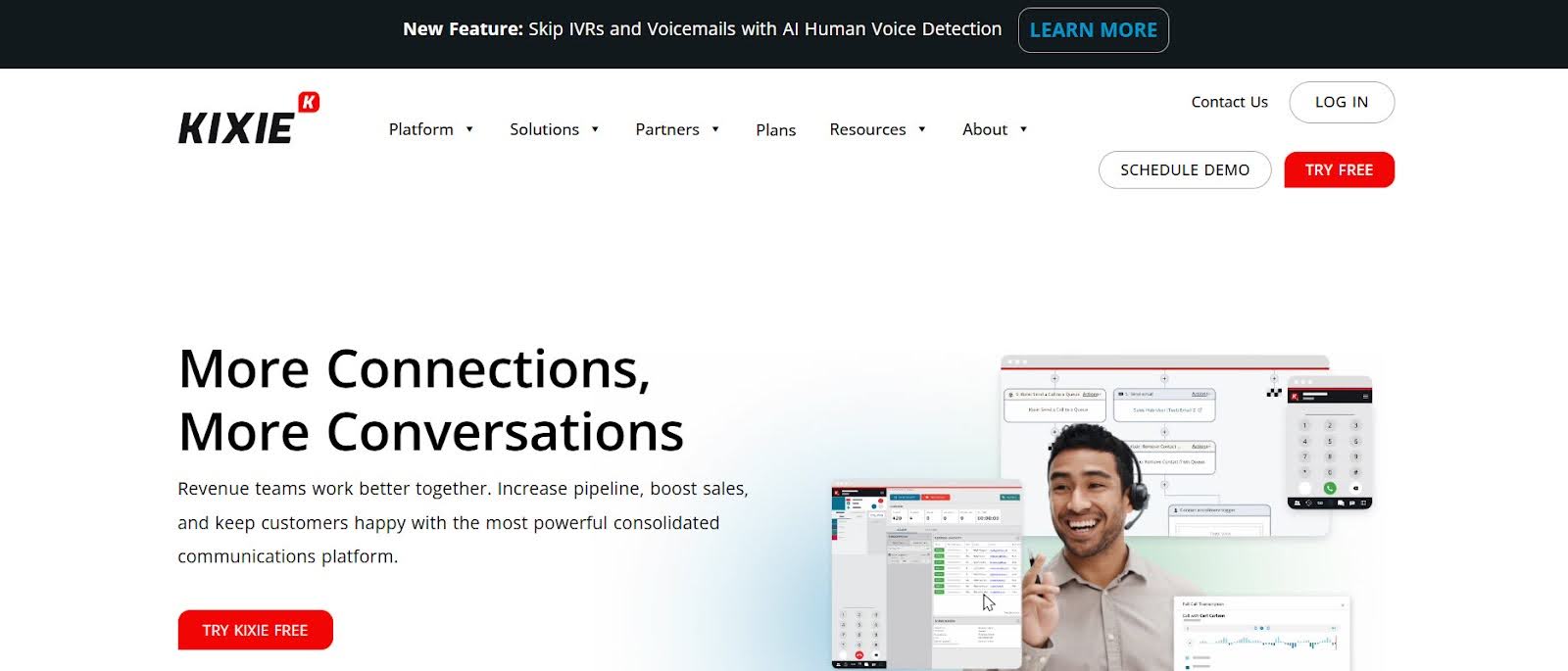
- Founded: 2013
- Headquarters: Santa Monica, CA
Why it works: Kixie is best known as a power dialer, but its AI answering flows allow for seamless handling of missed inbound calls. Sales teams use it to maintain momentum when juggling high outbound volume.
Key Features:
- AI voicemail detection and auto-responses
- Voicemail drop and local presence dialing
- Sales cadence tools with call analytics
- CRM integrations (Pipedrive, Zoho, Salesforce)
Target market: Outbound-heavy teams, SDR orgs, high-velocity sales
11) Slang.ai – Best for Hospitality and Restaurant Chains
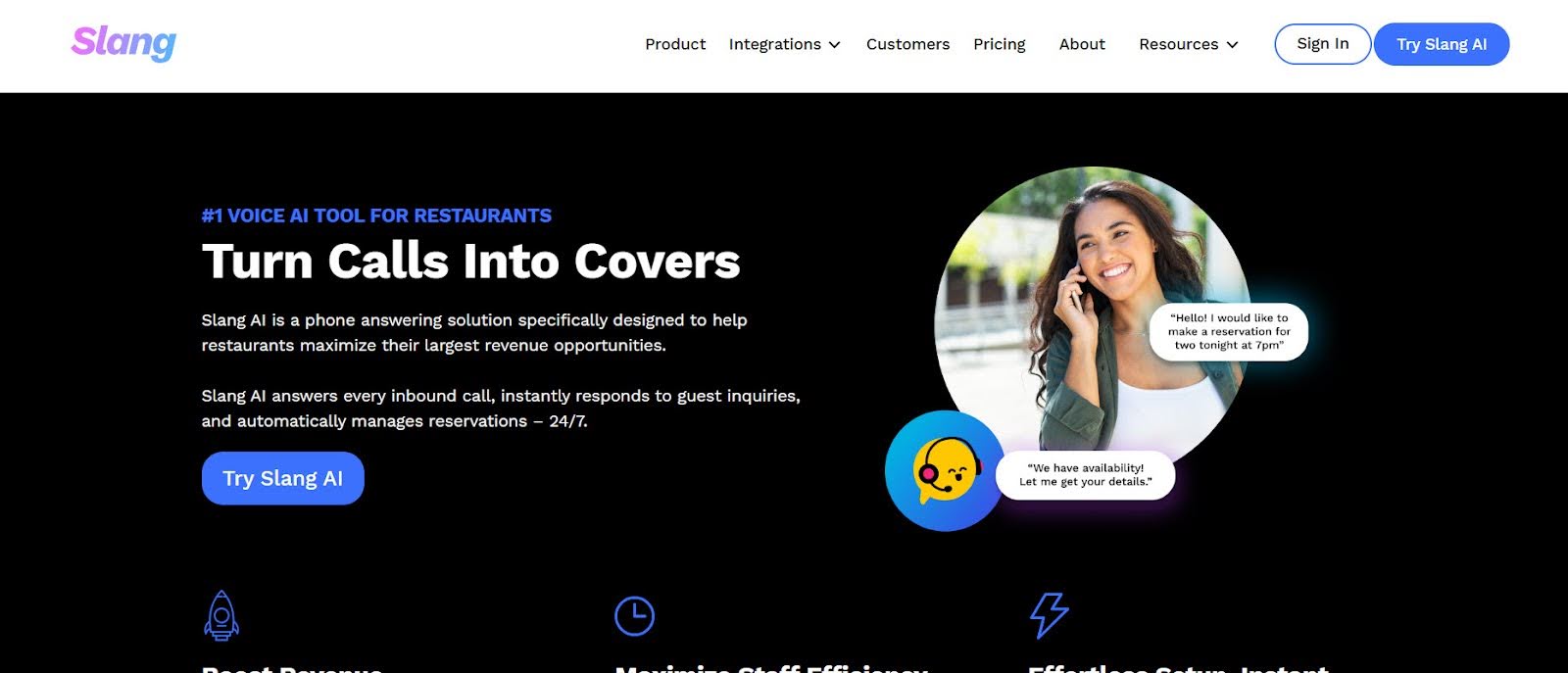
- Founded: 2019
- Headquarters: New York, NY
Why it works: Slang.ai is designed specifically for restaurants, retail chains, and hospitality. It picks up common calls (menus, hours, reservations), answers them with voice AI, and logs the rest for staff follow-up.
Key Features:
- Pre-trained voice AI for industry-specific FAQs
- Auto-deflection of routine calls
- Support for multiple locations with centralized control
- Syncs with booking systems like OpenTable
Target market: Restaurants, hotels, retail stores, and franchises
12) Go Answer – Best for Bilingual AI Agents
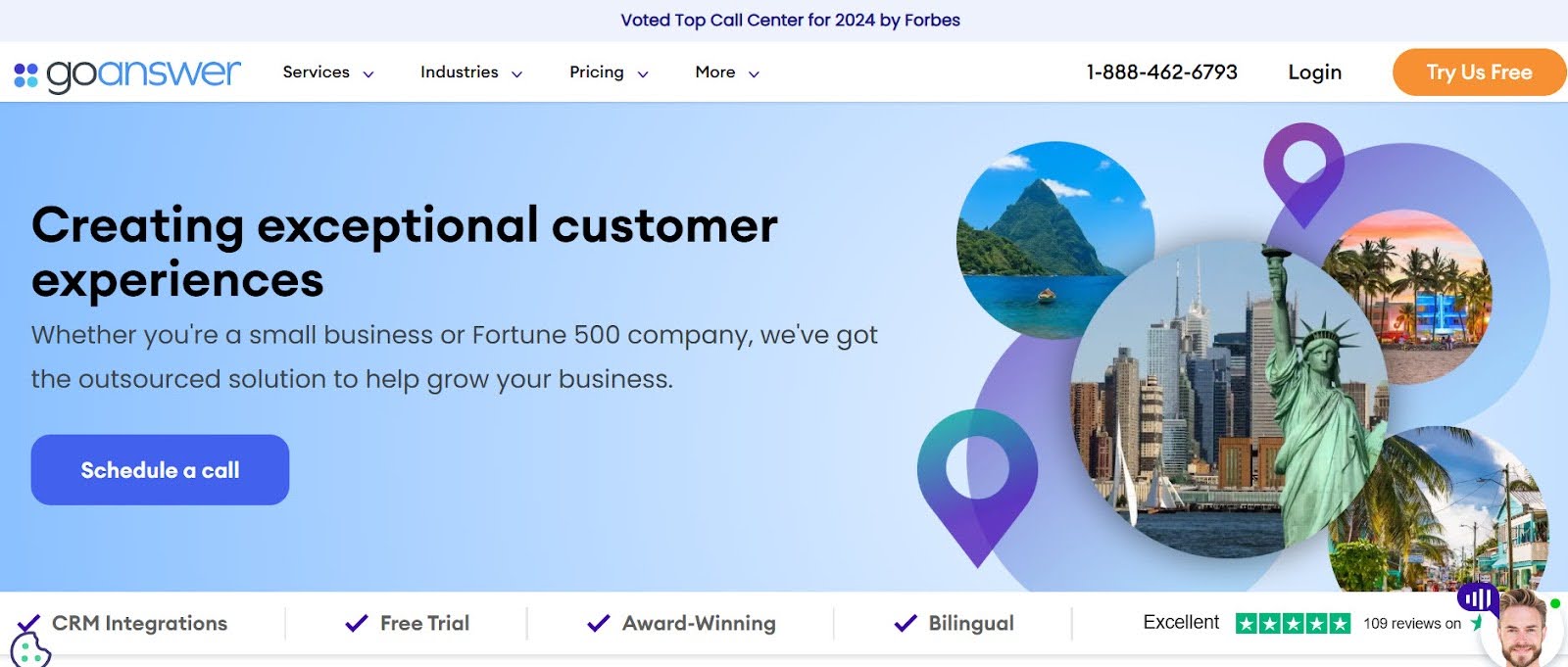
- Founded: 2012
- Headquarters: Garden City, NY
Why it works: Go Answer offers fluent, bilingual voice AI built for U.S. service businesses that field calls in both English and Spanish. It combines AI accuracy with call center scale.
Key Features:
- Dual-language answering with fallback options
- AI + live agent blend
- Industry templates for legal, healthcare, and real estate
- Call routing + CRM logging
Target market: Regional businesses, multilingual service providers, and legal/medical offices
How to Evaluate AI Answering Services in 2025
Not all AI answering tools are built for the same kinds of calls or the same kind of teams. Choosing the right one isn’t just about features; it’s about fit. Here’s how to cut through the noise:
1) Know Your Inbound Call Types
- Are most of your calls sales-related? You’ll want strong lead qualification, CRM sync, and fast routing.
- Is this more about support triage? Prioritize summarization, ticket creation, and integration with tools like Zendesk or Help Scout.
- For appointment-heavy businesses (healthcare, legal, services), booking flows and reminders matter more than AI tone polish.
Pro tip: The best tools let you tailor workflows by call type.
2) Understand How It Handles and Scores Leads
- Does it ask qualifying questions?
- Can it detect buying signals and escalate the right ones?
- Can you assign lead scores or segment call types in your CRM?
Look for tools that can move beyond “answer + record” and into “answer + route + act.”
3) Control the Prompts (and the Voice Behind Them)
- Can you customize how the AI speaks, greets, and responds?
- Do you have access to the prompt logic or are you stuck with generic scripts?
- Can the AI sound like a natural extension of your brand?
Bonus: Some tools now offer cloned voice options or multilingual support. Great if tone matters to your customer experience.
4) Evaluate Integration Depth
A missed call that doesn’t log to your system is still a missed opportunity.
- Does the tool push full transcripts to your CRM or helpdesk?
- Can it trigger Slack alerts or webhook-based workflows?
- Does it sync caller data with tools you already use (e.g., Calendly, Intercom, Clio)?
5) Track the Real Operational Metrics
The best AI answering tools pay for themselves by improving speed and conversion.
- First-response time (before vs. after AI)
- Call abandonment rate
- Number of leads saved outside of business hours
- Revenue attributed to AI-routed calls
Remember: If it’s not measurable, it’s not operationally reliable.
5) Review Operational Metrics Post-Rollout
Track first-response speed, call abandonment rate, and attribution from AI-routed leads.
Why AI Answering Services Are Now Table Stakes
It used to be that answering the phone was a formality. Now it’s a conversion lever, a brand signal, and (if done well) a measurable part of your revenue stack.
Across industries, operators are realizing that responsiveness isn’t just good support, it’s strategy. Inbound calls aren’t random; they’re high-intent signals. And in a landscape where attention is short and switching costs are low, the window to act is measured in minutes, not days.
The right AI answering service doesn’t just “pick up the phone.” It captures the context, routes the opportunity, and ensures your team knows who to call, when, and why. It keeps your brand responsive even when your humans are unavailable. And over time, it becomes a quiet but essential part of how your ops, support, and sales teams run.
If you’re still relying on voicemail or missed call alerts, you’re not just losing time; you’re likely losing deals.

Source: 12 Best AI Answering Services to Save Time and Automate Support




